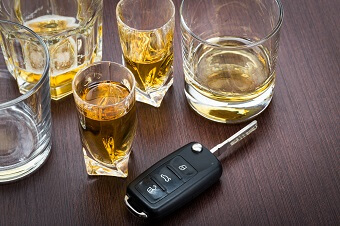

The Crime Of Driving While Intoxicated In The State Of Texas
Driving while intoxicated is a crime, no matter the circumstances. So it’s Friday night and you go to a bar with friends to unwind after a long week at work. After a few drinks, you head home. Since you feel like you’re only slightly tipsy from a few drinks, you decide to drive.
Ten minutes later, you see red and blue lights in your rearview mirror. A cop is on your tail, urging you to pull over. You break into a cold sweat knowing full well that you had a few drinks. You’re thinking, they probably won’t notice. Maybe you have a broken taillight. Your mind starts racing, thinking of all the possible scenarios and you wonder what they could possibly do to determine if you’re drunk or not.
What Exactly Is A DWI?
Driving while intoxicated (DWI) is a crime that
The Penal Code of Texas provides that “a person commits an offense if the person is intoxicated while operating a motor vehicle in a public place.” The same Code defines “intoxicated” as either:
- “Not having the normal use of mental or physical faculties by reason of the introduction of alcohol, a controlled substance, a drug, a dangerous drug, a combination of two or more of those substances, or any other substance into the body”
- “Having an alcohol concentration of 0.08 or more.”
Since either of the two conditions meets the qualification for intoxication, you don’t need to have a BAC beyond the limit to be considered intoxicated. If sobriety tests show that you have impaired mental or physical abilities because of alcohol or other drugs you may be deemed intoxicated.
Field Sobriety Tests
These tests are used by law enforcement to determine a person’s control of their mental and physical faculties. Most of the time these tests are done before a Breathalyzer test. If you are pulled over by a police officer who believes you are driving while intoxicated, they will likely have you do the sobriety tests right there by the roadside.
Law enforcement agencies use the Standardized Field Sobriety Test (SFST). It is a series of tests approved by the National Highway Traffic and Safety Administration (NHTSA). The tests are as follows:
● Horizontal Gaze Nystagmus
Nystagmus is a condition that happens naturally when your eye looks to the side and does an involuntary jerking. When a person is impaired by alcohol consumption, nystagmus becomes exaggerated. There are three indicators that officers look for:
- Your eyes are not able to follow a moving object in a smooth manner.
- When each eye reaches the farthermost corner it does a very distinct jerking movement.
- When the eye reaches 45 degrees from the center it starts to jerk.
● Walk And Turn Test
This test is applied to determine if you are able to complete a simple detailed task with full attention. You will be asked to take nine steps forward, along a straight line, and stepping from heel to toe. Then you will turn on one foot to face the direction you came from and go back the same way.
● One-Leg Stand


The results of the tests will be taken as a whole and can be used to determine alcohol impairment. About 91% of the time, the test is accurate in determining impairment. If you fail the test you will be asked to do the breathalyzer test to check your alcohol concentration.
There are also other tests that police officers can ask you to do. These are non-standardized tests but can help them test for impairment further. They may ask you to count the number of fingers they hold up in front of you. Or you may be asked to recite the alphabet or count backwards. They can test your balance by asking you to stand and look up while holding your arms out to the side.
You will not be penalized for refusing to do a field sobriety test but your refusal may be used against you later on if your case reaches a trial. The jury can take your refusal as evidence against you. If you refuse a breathalyzer test, however, you will be considered in violation of the implied consent law. Your license will be automatically suspended for no less than 180 days.
One of the most effective defenses used by criminal defense lawyers to fight a DWI charge is the reliability of field sobriety tests. If you do find yourself facing a DWI charge, speak with an experienced DWI lawyer who has intimate knowledge of the intricacies of DWI laws.
DWI Charge & Penalties
The following are the DWI offense categories and their corresponding punishments according to the Texas Penal Code:
First Offense
The first offense is considered a Class B misdemeanor and punishable by a fine of no more than $2,000 and jail time of no more than 180 days. However, a first offense can be enhanced to a Class A misdemeanor if your blood alcohol concentration is 0.15 or more at the time you were driving. In this case, a Class A misdemeanor means the maximum fine becomes $4,000 and the jail sentence will be no more than one year instead of 180 days.
For a first offense, you will get a license renewal surcharge everytime you renew your license for up to $2,000 every year for three years. Speaking of license, your license will be suspended for one year. When you become eligible to reacquire your license, that’s when the surcharge is applied.
Second Offense
If you are convicted for DWI for the second time it becomes an automatic Class A misdemeanor. As mentioned above, it is punishable by $4,000 in fines and up to one year of jail time in the county jail. On top of the punishment, your license will be suspended for two years. Surcharge upon reinstatement will be $2,000 per year for three years.
Third Offense
If you get convicted for DWI for a third time, the offense is classified as a third-degree felony. This time the offense will be punishable by a fine of $10,000 and imprisonment in the state penitentiary for up to 10 years. For a third conviction, license suspension will be for two years and a surcharge of $2,000 upon renewal every year for three years.
Fourth Offense
For a fourth DWI conviction, the fine is raised up to a maximum of $20,000. The prison maximum sentence is 10 years. License suspension and surcharge are the same as for second, third, and fourth convictions.
DWI Consequences
Sure, if you get a DWI conviction, you pay the fine and serve the jail sentence. Aside from that, you get administrative penalties like license suspension and license renewal surcharge. However, these are not the only consequences you may face following a conviction.
You will be facing consequences that affect your personal and professional life. A DWI conviction is a criminal record that will haunt you for years to come. It may affect personal relationships. It will definitely affect your ability to rent a home. Prospective landlords do background checks upon your application to rent. Many consider a criminal record as a ground to refuse applications.
A criminal record will affect your career. Prospective employers do background checks as well. Private companies have the prerogative to refuse employment based on an applicant’s criminal records.
Lawyer Up
If you do find yourself in the unfortunate situation of being charged with a DWI, find a reliable DWI attorney who has experience and knowledge in DWI criminal defense. Competent lawyers have successfully fought off DWI charges even with damning evidence against the defendant.
That is not to say that your charges will be dropped or you will be acquitted for sure. However, it means that the situation is not hopeless and the right lawyer can help you protect your rights and ensure that all remedies are exhausted in your defense.
The Medlin Law Firm is a multi-awarded law firm that focuses on criminal defense. Their diligent and compassionate attorneys are dedicated to defending the rights of the accused. They provide you with personalized representation because they understand that each case is unique. They have successfully represented thousands of clients and continue to do so. They handle different types of criminal defense cases including DWI charges. You can get more information on the firm through their official website. They offer a free consultation so you can see for yourself if your case is a good fit for their services.
DWI Lawyer – Delivering Outstading Results To Each Case
&
(214) 888-4810 We cannot receive pictures via text so please send those via email or hand deliver to our office.
(214) 888-4810 No podemos recibir imágenes por mensaje de texto, así que envíelas por correo electrónico o entréguelas personalmente en nuestra oficina.






